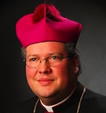
Prime Bishop Anthony Mikovsky
Jesus, the Bread of Life
In this second of our liturgical years, known as Year B, we spend most of the Ordinary Time weeks working our way through the Gospel of St. Mark. But since this Gospel is the shortest of the three synoptic gospels, there is ample space for us to take a short detour to the Gospel of St. John. Beginning on the 17th Sunday in Ordinary Time and continuing until the 21st Sunday in Ordinary Time we will be working our way through the 6th Chapter of the Gospel of John. This portion of the Gospel is of vital importance for us, especially as we consider our participation in the Holy Eucharist.
During each year we do spend some time reflecting on the Holy Eucharist. Each year on Holy Thursday we celebrate the Solemnity of the Lord’s Supper as we reflect on that evening in which our Lord Jesus Christ gathered with His disciples and for the first time celebrated with them, within the context of a Passover meal, the Holy Eucharist. But it is difficult for us to bring the right intention to this moment especially since we find ourselves then in the middle of Holy Week. We had just come through the celebration of Palm Sunday with its joyous triumphant entry into the city of Jerusalem. The mood also turns quickly as during that Mass we read the Passion of our Lord. We also know that Good Friday is soon to come and with it the great sorrow of the Church at the suffering of our Lord and His death on the Cross. Because of all this it is difficult to spend any significant time in reflection on the Eucharist on Holy Thursday.
Because of this, the Church has also given to us the celebration of the Solemnity of Corpus Christi on the Thursday following Trinity Sunday. The celebration remains on a Thursday to hearken back to Holy Thursday, but it occurs following the Easter season so we may spend a little more time in reflection on the great importance of the Holy Eucharist. But even here this celebration is found within the context of the great solemnities of the Church. During this short season we celebrate four solemnities in a row, as important and vital aspects of the Church. We begin with the Solemnity of Pentecost, the Descent of the Holy Spirit, as the beginnings or birthday of the Church. Then the Solemnity of the Holy Trinity as the foundational belief of the Christian Church, the Solemnity of Corpus Christi as the primary worship and sustenance of the Church and finally within the Polish National Catholic Church, the Solemnity of the Word of God, as the means by which the building of the kingdom of God, the work of the Church, is given to all believers. So even here we do not have ample time for reflection on what the Holy Eucharist is for us as individuals and then what the Eucharist is for us as the Body of Christ as it works in the world today.
It is for this reason that once every three years, on the 17th to 21st Sundays in Ordinary Time, in the second of the liturgical cycles, we take an extended period of time to reflect on the great importance of the Holy Eucharist for us as individuals and for the entire community of faith gathered for worship.
As we go through Chapter 6 of John’s Gospel, we begin by noticing that this is not the time of the Last Supper within the Gospel. In fact, within the Gospel of John there is not a place where the Eucharist is instituted as it is in the other Gospels, rather chapter 6 gives us an extended teaching of Jesus on Himself as the Bread of Life.
We begin with the miracle of the feeding of the five thousand. Jesus is continuing to teach as He has been in the Gospel of Mark, but at one point He tries to break away with the apostles for some moments in prayer. The crowds are not deterred though, and they follow Jesus in great numbers. When Jesus sees this large crowd, He asks Philip, “Where can we buy enough food for them to eat?” Philip answers Him, “Two hundred days wages worth of food would not be enough for each of them to have a little bit.” (John 6:5b, 7) This stalemate is broken when Andrew says to Jesus, “There is a boy here who has five barley loaves and two fish; but what good are these for so many?” (John 6:9) We remind ourselves here that throughout the entire Gospel the works of the kingdom are accomplished through a divine and human cooperation. It is true that five barley loaves and two fish are not enough to solve the problem, but we also know that when we bring what we have and place it at the feet of Jesus, He will accomplish great things if we can offer Him all that we have.
Now following this miracle Jesus will teach those who follow concerning the true meaning of the Bread of Life. He speaks to the crowds seeking some daily bread that they need to look for something more. “Do not work for food that perishes but for the food that endures for eternal life, which the Son of Man will give you.” (John 6:27) But Jesus’ followers do not completely understand and they remind Him that during the Exodus, Moses gave them manna from heaven. Then Jesus counters, “It was not Moses who gave the bread from heaven; My Father gives you the true bread from heaven. For the bread of God is that which comes down from heaven and gives life to the world.” (John 6:32-33) We are reminded here that all that we have and all that we possess comes to us from God. We cannot even say that we have obtained anything of ourselves. But are also reminded that in a very special way we also can receive Christ Himself when we gather for the reception of Holy Communion. In receiving the Holy Eucharist, we receive the same Christ Who died on the Cross for the forgiveness of our sins and rose from the dead to bring us new and everlasting life.
Following this Jesus says to His followers quite plainly, “I am the Bread of Life; whoever comes to Me will never hunger, and whoever believes in Me will never thirst. … And this is the will of the One Who sent Me, that I should not lose anything of what He gave Me, but that I should raise it on the last day. For this is the will of My Father, that everyone who sees the Son and believes in Him may have eternal life, and I shall raise him on the last day.” (John 6:35, 39-40) Jesus shows that the reception of the Holy Eucharist is not pointed beyond sustenance in this world, but rather it is pointed to life eternal, which is the will of the Heavenly Father. In the Eucharist we are not only united to Christ here and now, but we are united to Him eternally.
In the concluding portion of this discourse Jesus speaks of the true reality of the Holy Eucharist. It is not only a symbol, but it is rather His true Body and Blood, “Amen, amen, I say to you, unless you eat the flesh of the Son of Man and drink His blood, you do not have life within you. Whoever eats My flesh and drinks My blood has eternal life, and I will raise him on the last day. For My flesh is true food, and My blood is true drink. Whoever eats My flesh and drinks My blood remains in Me and I in him. Just as the living Father sent Me and I have life because of the Father, so also the one who feeds on Me will have life because of Me.” (John 6:53-57)
For many who heard this teaching then, it was hard for them to accept. Some in fact drifted away. But Jesus did not explain Himself further. His teaching on this matter stood as it was presented. He then asked the apostles if they wanted to leave as well. They answered with words that should be on our lips as well, “Master, to whom shall we go? You have the words of eternal life.” (John 6:68)
This is the reality which is occurring each and every time we come to Holy Mass and receive the Body and Blood of Jesus Christ. During the celebration, Christ comes into our midst in the consecration of the bread and wine into the Body and Blood of Christ. And then we not only adore Him present, but we receive Him into our very selves, and we are joined as another divine and human cooperation. Christ lives in us because of this communion. “If we love one another, God remains in us, and His love is brought to perfection in us.” (1 John 4:12)
My brothers and sisters, these upcoming weeks within our Ordinary Time Season are of vital importance. They reveal to us exactly why the celebration of the Holy Sacrifice of the Mass is so vital to all that we are as people created by God and for God through Jesus Christ. During each of these five weeks let us have a renewed spirit within us that seeks to unite ourselves to Christ in the Holy Eucharist. Let us believe with all our being these words of Jesus, “This is the bread that came down from heaven. … whoever eats this bread will live forever.” (John 6:58a,c)

